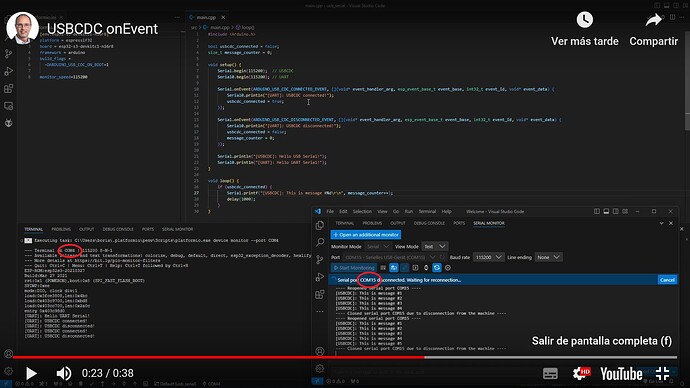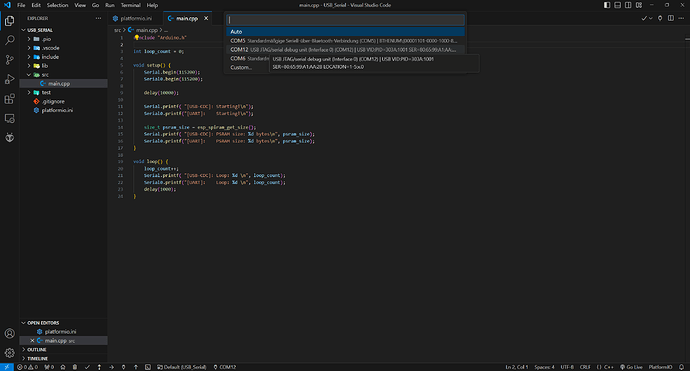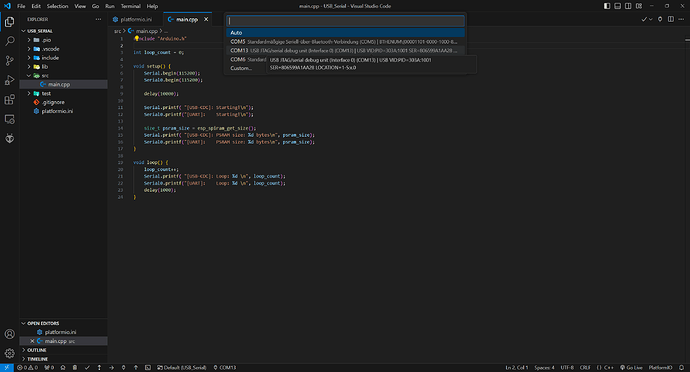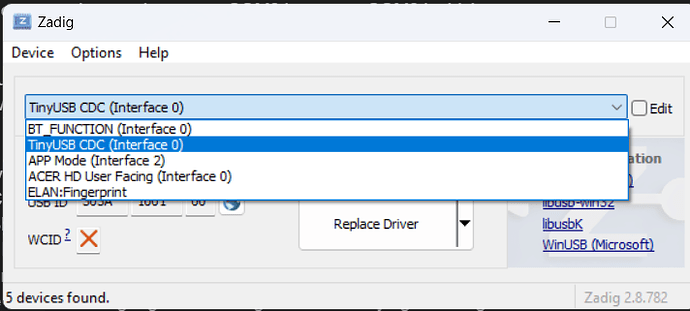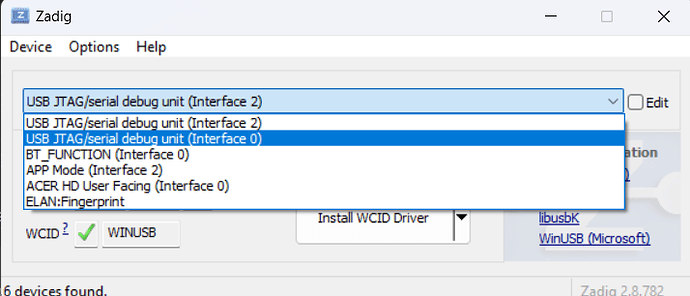This is my environment.
Device manager COM port section (Only one USB cable, connected to the USB connector of the Kit)
ESP32-S3-DevKitC-1.1 N8R2

PLATFORMIO.INI file
[env:esp32-s3-devkitc-1-n8r2]
platform = espressif32
board = esp32-s3-devkitc-1-n8r2
framework = arduino
monitor_speed = 115200
upload_port = COM34
monitor_port = COM34
build_flags =
-DARDUINO_USB_CDC_ON_BOOT=1 ; Serial Monitor on Serial0
-DARDUINO_USB_MODE=0 ; Serial on USBCDC
-DCORE_DEBUG_LEVEL=5
CODE
#include "Arduino.h"
#include <USBCDC.h>
int loop_count = 0;
void setup() {
Serial.begin(115200);
Serial0.begin(115200);
delay(10000);
Serial.printf( "[USB-CDC]: Starting!\n");
Serial0.printf("[UART]: Starting!\n");
size_t psram_size = esp_spiram_get_size();
Serial.printf( "[USB-CDC]: PSRAM size: %d bytes\n", psram_size);
Serial0.printf("[UART]: PSRAM size: %d bytes\n", psram_size);
}
void loop() {
loop_count++;
Serial.printf( "[USB-CDC]: Loop: %d \n", loop_count);
Serial0.printf("[UART]: Loop: %d \n", loop_count);
delay(1000);
}
COMPILE of code
Processing esp32-s3-devkitc-1-n8r2 (platform: espressif32; board: esp32-s3-devkitc-1-n8r2; framework: arduino)
-------------------------------------------------------------------------------------------------------------------------------------------------------------------------------------------------Verbose mode can be enabled via `-v, --verbose` option
CONFIGURATION: https://docs.platformio.org/page/boards/espressif32/esp32-s3-devkitc-1-n8r2.html
PLATFORM: Espressif 32 (6.7.0) > Espressif ESP32-S3-DevKitC-1-N8R2 (8 MB QD, 2 MB QD PSRAM)
HARDWARE: ESP32S3 240MHz, 320KB RAM, 8MB Flash
DEBUG: Current (esp-builtin) On-board (esp-builtin) External (cmsis-dap, esp-bridge, esp-prog, iot-bus-jtag, jlink, minimodule, olimex-arm-usb-ocd, olimex-arm-usb-ocd-h, olimex-arm-usb-tiny-h,
olimex-jtag-tiny, tumpa)
PACKAGES:
- framework-arduinoespressif32 @ 3.20016.0 (2.0.16)
- tool-esptoolpy @ 1.40501.0 (4.5.1)
- toolchain-riscv32-esp @ 8.4.0+2021r2-patch5
- toolchain-xtensa-esp32s3 @ 8.4.0+2021r2-patch5
LDF: Library Dependency Finder -> https://bit.ly/configure-pio-ldf
LDF Modes: Finder ~ chain, Compatibility ~ soft
Found 33 compatible libraries
Scanning dependencies...
No dependencies
Building in release mode
Compiling .pio\build\esp32-s3-devkitc-1-n8r2\src\main.cpp.o
Building .pio\build\esp32-s3-devkitc-1-n8r2\bootloader.bin
Generating partitions .pio\build\esp32-s3-devkitc-1-n8r2\partitions.bin
esptool.py v4.5.1
Creating esp32s3 image...
Merged 1 ELF section
Successfully created esp32s3 image.
Compiling .pio\build\esp32-s3-devkitc-1-n8r2\FrameworkArduino\Esp.cpp.o
Compiling .pio\build\esp32-s3-devkitc-1-n8r2\FrameworkArduino\FirmwareMSC.cpp.o
Compiling .pio\build\esp32-s3-devkitc-1-n8r2\FrameworkArduino\FunctionalInterrupt.cpp.o
Compiling .pio\build\esp32-s3-devkitc-1-n8r2\FrameworkArduino\HWCDC.cpp.o
Compiling .pio\build\esp32-s3-devkitc-1-n8r2\FrameworkArduino\HardwareSerial.cpp.o
Compiling .pio\build\esp32-s3-devkitc-1-n8r2\FrameworkArduino\IPAddress.cpp.o
Compiling .pio\build\esp32-s3-devkitc-1-n8r2\FrameworkArduino\IPv6Address.cpp.o
Compiling .pio\build\esp32-s3-devkitc-1-n8r2\FrameworkArduino\MD5Builder.cpp.o
Compiling .pio\build\esp32-s3-devkitc-1-n8r2\FrameworkArduino\Print.cpp.o
Compiling .pio\build\esp32-s3-devkitc-1-n8r2\FrameworkArduino\Stream.cpp.o
Compiling .pio\build\esp32-s3-devkitc-1-n8r2\FrameworkArduino\StreamString.cpp.o
Compiling .pio\build\esp32-s3-devkitc-1-n8r2\FrameworkArduino\Tone.cpp.o
Compiling .pio\build\esp32-s3-devkitc-1-n8r2\FrameworkArduino\USB.cpp.o
Compiling .pio\build\esp32-s3-devkitc-1-n8r2\FrameworkArduino\USBCDC.cpp.o
Compiling .pio\build\esp32-s3-devkitc-1-n8r2\FrameworkArduino\USBMSC.cpp.o
Compiling .pio\build\esp32-s3-devkitc-1-n8r2\FrameworkArduino\WMath.cpp.o
Compiling .pio\build\esp32-s3-devkitc-1-n8r2\FrameworkArduino\WString.cpp.o
Compiling .pio\build\esp32-s3-devkitc-1-n8r2\FrameworkArduino\base64.cpp.o
Compiling .pio\build\esp32-s3-devkitc-1-n8r2\FrameworkArduino\cbuf.cpp.o
Compiling .pio\build\esp32-s3-devkitc-1-n8r2\FrameworkArduino\esp32-hal-adc.c.o
Compiling .pio\build\esp32-s3-devkitc-1-n8r2\FrameworkArduino\esp32-hal-bt.c.o
Compiling .pio\build\esp32-s3-devkitc-1-n8r2\FrameworkArduino\esp32-hal-cpu.c.o
Compiling .pio\build\esp32-s3-devkitc-1-n8r2\FrameworkArduino\esp32-hal-dac.c.o
Compiling .pio\build\esp32-s3-devkitc-1-n8r2\FrameworkArduino\esp32-hal-gpio.c.o
Compiling .pio\build\esp32-s3-devkitc-1-n8r2\FrameworkArduino\esp32-hal-i2c-slave.c.o
Compiling .pio\build\esp32-s3-devkitc-1-n8r2\FrameworkArduino\esp32-hal-i2c.c.o
Compiling .pio\build\esp32-s3-devkitc-1-n8r2\FrameworkArduino\esp32-hal-ledc.c.o
Compiling .pio\build\esp32-s3-devkitc-1-n8r2\FrameworkArduino\esp32-hal-matrix.c.o
Compiling .pio\build\esp32-s3-devkitc-1-n8r2\FrameworkArduino\esp32-hal-misc.c.o
Compiling .pio\build\esp32-s3-devkitc-1-n8r2\FrameworkArduino\esp32-hal-psram.c.o
Compiling .pio\build\esp32-s3-devkitc-1-n8r2\FrameworkArduino\esp32-hal-rgb-led.c.o
Compiling .pio\build\esp32-s3-devkitc-1-n8r2\FrameworkArduino\esp32-hal-rmt.c.o
Compiling .pio\build\esp32-s3-devkitc-1-n8r2\FrameworkArduino\esp32-hal-sigmadelta.c.o
Compiling .pio\build\esp32-s3-devkitc-1-n8r2\FrameworkArduino\esp32-hal-spi.c.o
Compiling .pio\build\esp32-s3-devkitc-1-n8r2\FrameworkArduino\esp32-hal-time.c.o
Compiling .pio\build\esp32-s3-devkitc-1-n8r2\FrameworkArduino\esp32-hal-timer.c.o
Compiling .pio\build\esp32-s3-devkitc-1-n8r2\FrameworkArduino\esp32-hal-tinyusb.c.o
Compiling .pio\build\esp32-s3-devkitc-1-n8r2\FrameworkArduino\esp32-hal-touch.c.o
Compiling .pio\build\esp32-s3-devkitc-1-n8r2\FrameworkArduino\esp32-hal-uart.c.o
Compiling .pio\build\esp32-s3-devkitc-1-n8r2\FrameworkArduino\firmware_msc_fat.c.o
Compiling .pio\build\esp32-s3-devkitc-1-n8r2\FrameworkArduino\libb64\cdecode.c.o
Compiling .pio\build\esp32-s3-devkitc-1-n8r2\FrameworkArduino\libb64\cencode.c.o
Compiling .pio\build\esp32-s3-devkitc-1-n8r2\FrameworkArduino\main.cpp.o
Compiling .pio\build\esp32-s3-devkitc-1-n8r2\FrameworkArduino\stdlib_noniso.c.o
Compiling .pio\build\esp32-s3-devkitc-1-n8r2\FrameworkArduino\wiring_pulse.c.o
Compiling .pio\build\esp32-s3-devkitc-1-n8r2\FrameworkArduino\wiring_shift.c.o
Archiving .pio\build\esp32-s3-devkitc-1-n8r2\libFrameworkArduino.a
Linking .pio\build\esp32-s3-devkitc-1-n8r2\firmware.elf
Retrieving maximum program size .pio\build\esp32-s3-devkitc-1-n8r2\firmware.elf
Checking size .pio\build\esp32-s3-devkitc-1-n8r2\firmware.elf
Advanced Memory Usage is available via "PlatformIO Home > Project Inspect"
RAM: [= ] 9.5% (used 31192 bytes from 327680 bytes)
Flash: [= ] 9.5% (used 317493 bytes from 3342336 bytes)
Building .pio\build\esp32-s3-devkitc-1-n8r2\firmware.bin
esptool.py v4.5.1
Creating esp32s3 image...
Merged 2 ELF sections
Successfully created esp32s3 image.
================================================================================= [SUCCESS] Took 28.25 seconds =================================================================================
* Terminal will be reused by tasks, press any key to close it.
UPLOAD of code
Executing task: C:\Users\tmagdahl\.platformio\penv\Scripts\platformio.exe run --target upload
Processing esp32-s3-devkitc-1-n8r2 (platform: espressif32; board: esp32-s3-devkitc-1-n8r2; framework: arduino)
-------------------------------------------------------------------------------------------------------------------------------------------------------------------------------------------------Verbose mode can be enabled via `-v, --verbose` option
CONFIGURATION: https://docs.platformio.org/page/boards/espressif32/esp32-s3-devkitc-1-n8r2.html
PLATFORM: Espressif 32 (6.7.0) > Espressif ESP32-S3-DevKitC-1-N8R2 (8 MB QD, 2 MB QD PSRAM)
HARDWARE: ESP32S3 240MHz, 320KB RAM, 8MB Flash
DEBUG: Current (esp-builtin) On-board (esp-builtin) External (cmsis-dap, esp-bridge, esp-prog, iot-bus-jtag, jlink, minimodule, olimex-arm-usb-ocd, olimex-arm-usb-ocd-h, olimex-arm-usb-tiny-h,
olimex-jtag-tiny, tumpa)
PACKAGES:
- framework-arduinoespressif32 @ 3.20016.0 (2.0.16)
- tool-esptoolpy @ 1.40501.0 (4.5.1)
- tool-mkfatfs @ 2.0.1
- tool-mklittlefs @ 1.203.210628 (2.3)
- tool-mkspiffs @ 2.230.0 (2.30)
- toolchain-riscv32-esp @ 8.4.0+2021r2-patch5
- toolchain-xtensa-esp32s3 @ 8.4.0+2021r2-patch5
LDF: Library Dependency Finder -> https://bit.ly/configure-pio-ldf
LDF Modes: Finder ~ chain, Compatibility ~ soft
Found 33 compatible libraries
Scanning dependencies...
No dependencies
Building in release mode
Retrieving maximum program size .pio\build\esp32-s3-devkitc-1-n8r2\firmware.elf
Checking size .pio\build\esp32-s3-devkitc-1-n8r2\firmware.elf
Advanced Memory Usage is available via "PlatformIO Home > Project Inspect"
RAM: [= ] 9.5% (used 31192 bytes from 327680 bytes)
Flash: [= ] 9.5% (used 317493 bytes from 3342336 bytes)
Configuring upload protocol...
AVAILABLE: cmsis-dap, esp-bridge, esp-builtin, esp-prog, espota, esptool, iot-bus-jtag, jlink, minimodule, olimex-arm-usb-ocd, olimex-arm-usb-ocd-h, olimex-arm-usb-tiny-h, olimex-jtag-tiny, tumpa
CURRENT: upload_protocol = esptool
Looking for upload port...
Using manually specified: COM34
Uploading .pio\build\esp32-s3-devkitc-1-n8r2\firmware.bin
esptool.py v4.5.1
Serial port COM34
Connecting...
Chip is ESP32-S3 (revision v0.2)
Features: WiFi, BLE
Crystal is 40MHz
MAC: dc:da:0c:61:9e:3c
Uploading stub...
Running stub...
Stub running...
Changing baud rate to 921600
Changed.
Configuring flash size...
Flash will be erased from 0x00000000 to 0x00003fff...
Flash will be erased from 0x00008000 to 0x00008fff...
Flash will be erased from 0x0000e000 to 0x0000ffff...
Flash will be erased from 0x00010000 to 0x0005dfff...
Compressed 15104 bytes to 10430...
Writing at 0x00000000... (100 %)
Wrote 15104 bytes (10430 compressed) at 0x00000000 in 0.2 seconds (effective 558.4 kbit/s)...
Hash of data verified.
Compressed 3072 bytes to 146...
Writing at 0x00008000... (100 %)
Wrote 3072 bytes (146 compressed) at 0x00008000 in 0.0 seconds (effective 625.4 kbit/s)...
Hash of data verified.
Compressed 8192 bytes to 47...
Writing at 0x0000e000... (100 %)
Wrote 8192 bytes (47 compressed) at 0x0000e000 in 0.1 seconds (effective 841.1 kbit/s)...
Hash of data verified.
Compressed 317856 bytes to 182694...
Writing at 0x00010000... (8 %)
Writing at 0x0001bcb0... (16 %)
Writing at 0x000243fa... (25 %)
Writing at 0x00029e9c... (33 %)
Writing at 0x0002f45d... (41 %)
Writing at 0x000347b6... (50 %)
Writing at 0x00039af5... (58 %)
Writing at 0x0003fd69... (66 %)
Writing at 0x0004a03e... (75 %)
Writing at 0x00051889... (83 %)
Writing at 0x00056de6... (91 %)
Writing at 0x0005c8a0... (100 %)
Wrote 317856 bytes (182694 compressed) at 0x00010000 in 2.3 seconds (effective 1104.3 kbit/s)...
Hash of data verified.
Leaving...
Hard resetting via RTS pin...
================================================================================== [SUCCESS] Took 8.09 seconds ================================================================================== * Terminal will be reused by tasks, press any key to close it.
SERIAL MONITOR window after 5 minutes (started inmediately after upload finished)
JSON file (just in case something is screwed up inside when I had to redo it). At some moment trying to figure out something I run a command recommended in a blog like “pio upgrade espressif32” or something like that and I lost my JSON file and had to redo it. (esp32-s3-devkitc-1-n8r2.json)
{
"build": {
"arduino": {
"ldscript": "esp32s3_out.ld",
"partitions": "default_8MB_devkitc_n8r2.csv",
"memory_type": "qio_qspi"
},
"core": "esp32",
"extra_flags": [
"-DARDUINO_ESP32S3_DEV",
"-DARDUINO_RUNNING_CORE=1",
"-DARDUINO_EVENT_RUNNING_CORE=1",
"-DBOARD_HAS_PSRAM"
],
"f_cpu": "240000000L",
"f_flash": "80000000L",
"flash_mode": "qio",
"psram_type": "qio",
"hwids": [
[
"0x303A",
"0x1001"
]
],
"mcu": "esp32s3",
"variant": "esp32s3"
},
"connectivity": [
"wifi",
"bluetooth"
],
"debug": {
"default_tool": "esp-builtin",
"onboard_tools": [
"esp-builtin"
],
"openocd_target": "esp32s3.cfg"
},
"frameworks": [
"arduino",
"espidf"
],
"platforms" : [
"espressif32"
],
"name": "Espressif ESP32-S3-DevKitC-1-N8R2 (8 MB QD, 2 MB QD PSRAM)",
"upload": {
"flash_size": "8MB",
"maximum_ram_size": 327680,
"maximum_size": 8388608,
"require_upload_port": true,
"speed": 921600
},
"url": "https://docs.espressif.com/projects/esp-idf/en/latest/esp32s3/hw-reference/esp32s3/user-guide-devkitc-1.html",
"vendor": "Espressif"
}
PRTITION file default_8MB_devkitc_n8r2.csv
# Name, Type, SubType, Offset, Size, Flags
nvs, data, nvs, 0x9000, 0x5000,
otadata, data, ota, 0xe000, 0x2000,
app0, app, ota_0, 0x10000, 0x330000,
app1, app, ota_1, 0x340000,0x330000,
spiffs, data, spiffs, 0x670000,0x180000,
coredump, data, coredump,0x7F0000,0x10000,
![]()
![]()
